
Thomas Carlyle Ford is an American fashion designer and filmmaker. He launched his eponymous brand in 2005, having previously been the creative director at Gucci and Yves Saint Laurent. Ford wrote and directed the films A Single Man (2009) and Nocturnal Animals (2016). From 2019 to 2022 he was chairman of the Council of Fashion Designers of America.

Love Actually is a 2003 romantic comedy film written and directed by Richard Curtis. The Christmas film features an ensemble cast, composed predominantly of British actors, many of whom had worked with Curtis in previous projects. An international co-production of the United Kingdom, United States, and France, it was mostly filmed on-location in London. The film delves into different aspects of love as shown through 10 separate stories involving a variety of individuals, many of whom are interlinked as the plot progresses. The story begins five weeks before Christmas and is played out in a weekly countdown until the holiday, followed by an epilogue that takes place in the New Year.
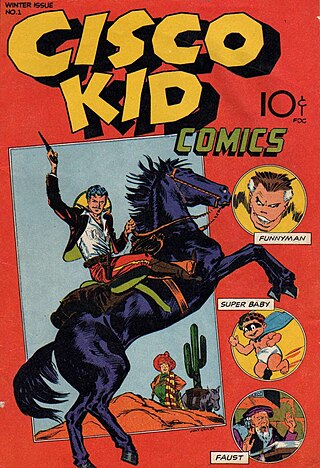
The Cisco Kid is a fictional character found in numerous film, radio, television and comic book series based on the fictional Western character created by O. Henry in his 1907 short story "The Caballero's Way", published in Everybody's Magazine, v17, July 1907, as well as in the collection Heart of the West (1907). Originally a murderous criminal in O. Henry's story, the Kid was depicted as a heroic Mexican caballero later in films, radio and television adaptations.

Edward Paul Flanders was an American actor. He is best known for playing Dr. Donald Westphall in the medical drama series St. Elsewhere (1982–1988). Flanders was nominated for eight Primetime Emmys and won three times in 1976, 1977, and 1983.
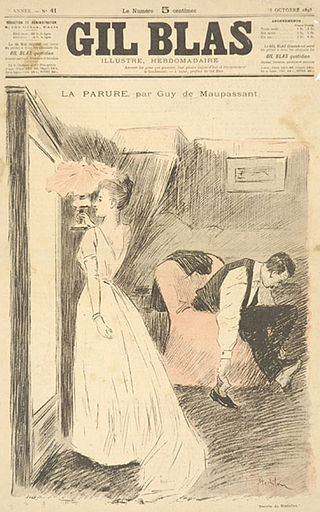
"The Necklace" is a short story by French writer Guy de Maupassant. It is known for its twist ending, which was a hallmark of de Maupassant's style. The story was first published on 17 February 1884 in the French newspaper Le Gaulois.

Song of Freedom is a 1936 British musical drama film directed by J. Elder Wills and starring Paul Robeson. It is an early feature produced by Hammer Film Productions.
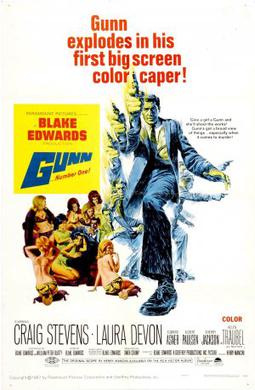
Gunn is a 1967 American neo noir mystery film directed by Blake Edwards, and starring Craig Stevens, based on the 1958-1961 television series Peter Gunn. Stevens was the only regular cast member from the original series to appear in the film; the characters of Gunn's singing girlfriend Edie Hart, club owner "Mother", and police lieutenant Jacoby were all recast for the film. The movie was intended to be the first in a projected series of Peter Gunn feature films, but no sequels followed.

Max Headroom is a fictional character played by actor Matt Frewer. Advertised as "the first computer-generated TV presenter", Max was known for his biting commentary on a variety of topical issues, arrogant wit, stuttering, and pitch-shifting voice. The character was created by George Stone, Annabel Jankel, and Rocky Morton. Max was advertised as "computer-generated", and some believed this, but he was actually actor Frewer wearing prosthetic makeup, contact lenses, and a plastic moulded suit, and sitting in front of a blue screen. Harsh lighting and other editing and recording effects heighten the illusion of a CGI character. According to his creators, Max's personality was meant to be a satirical exaggeration of the worst tendencies of television hosts in the 1980s who wanted to appeal to youth culture, yet were not a part of it. Frewer proposed that Max reflected an innocence, largely influenced not by mentors and life experience but by information absorbed from television.
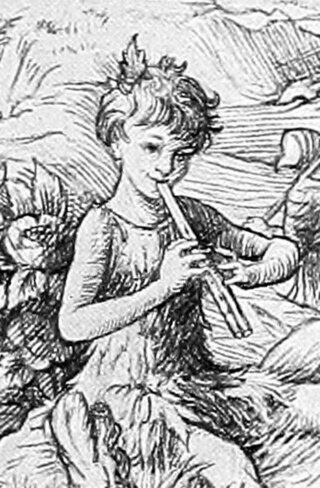
Peter Pan is a fictional character created by Scottish novelist and playwright J. M. Barrie. A free-spirited and mischievous young boy who can fly and never grows up, Peter Pan spends his never-ending childhood having adventures on the mythical island of Neverland as the leader of the Lost Boys, interacting with fairies, pirates, mermaids, Native Americans, and occasionally ordinary children from the world outside Neverland.

Pazuzu is a fictional character who is the main antagonist in The Exorcist horror novels and film series, created by William Peter Blatty. Blatty derived the character from Assyrian and Babylonian mythology, where the mythic Pazuzu was considered the king of the demons of the wind, and the son of the god Hanbi. In The Exorcist, Pazuzu appears as a demon who possesses Regan MacNeil.

Members of the U.S. Army Special Forces will emphatically assert that the "Green Beret" is a hat and not the man who wears it. Nevertheless, for a time in the 1960s the Green Berets and the men who wore them became a national fad emerging in a wide variety of popular culture referents. After a decline in popularity during the 1970s — coinciding with the American public's backlash against the Vietnam War — the Green Berets gripped the popular imagination again beginning with the Rambo film franchise in 1982. They continue to appear as both major and minor referents in popular culture — especially in movies and television — often serving as a shorthand signifier for a shady or covert military background for a fictional character. As a dramatic device, this can cut both ways — i.e., lead an audience to either admire or fear a character.
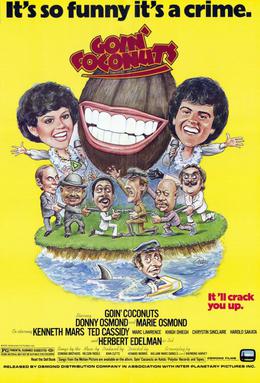
Goin' Coconuts is a 1978 American musical adventure comedy film directed by Howard Morris and starring Donny and Marie Osmond. The feature film tells a tale of Donny and Marie becoming embroiled in a dispute between two criminal gangs over a necklace while they visit Hawaii to perform in a concert. Released in theaters on October 18, 1978, it was both a critical and commercial failure.

Naruto the Movie: Ninja Clash in the Land of Snow is a 2004 anime martial arts fantasy adventure film based on Masashi Kishimoto's manga and anime Naruto. It was released in Japan on August 21, 2004. The film is set after episode 101. In the United States, the film aired on Cartoon Network on September 8, 2007. The ending song Home Sweet Home is performed by Yuki Isoya. The English adaptation replaced the song with Jeremy Sweet's "Never Give Up", due to licensing restrictions.

The Exorcist III is a 1990 American supernatural horror film written for the screen and directed by William Peter Blatty, based on his 1983 novel Legion. It is the third installment in The Exorcist film series, and the final installment in Blatty's "Trilogy of Faith" after The Ninth Configuration (1980). The film stars George C. Scott, Ed Flanders, Jason Miller, Scott Wilson, Nicol Williamson, and Brad Dourif.

A cross necklace is any necklace featuring a Christian cross or crucifix.

Cadfael is a British mystery television series, broadcast on ITV between 29 May 1994 and 28 December 1998, based on The Cadfael Chronicles novels written by Ellis Peters. Produced by Central, it starred Derek Jacobi as the medieval detective and title character, Brother Cadfael. The complete series was released on DVD on 24 August 2009. The series aired in the United States as part of the Mystery! series.

The Exorcist is an American horror media franchise that originated with William Peter Blatty's 1971 horror novel of the same name and most prominently featured in a 1973 film adaptation of the novel, and many subsequent prequels and sequels. All of these installments focus on fictional accounts of people possessed by Pazuzu, the main antagonist of the series, and the efforts of religious authorities to counter this possession.
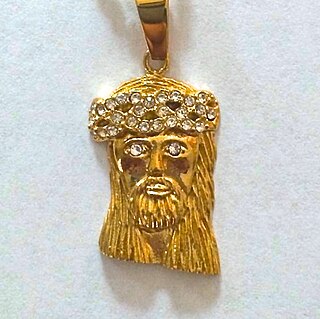
A Jesus piece is a spiritual or religious piece of jewelry that is popular in the hip hop community and depicts the face of Jesus with the crown made out of thorns. Many hip hop artists and celebrities, including The Notorious B.I.G., Jay-Z, Kanye West, Big Pun, The Game, Kendrick Lamar and Meek Mill among others, have adopted the Jesus piece as a common fashion accessory and have them decorated with many precious gems. Cheaper Jesus pieces have also been sold in other materials including wood and inexpensive metals. Traditional medals in Western Christianity that are worn as necklaces have depicted the Holy Face of Jesus.
"The Gift of the Woodi" is the nineteenth episode of the seventh season of the American television sitcom, Cheers, written by Phoef Sutton and directed by James Burrows. It originally aired on April 6, 1989, on NBC. In this episode, Woody Boyd sings a self-penned song "Kelly Kelly Kelly Kelly...", also called "The Kelly Song", as his birthday gift to his girlfriend Kelly Gaines. Cliff plans to popularize his invention "beetabaga", a vegetable hybrid of rutabaga and beetroot. Rebecca wants to downgrade her sexual appeal in attempt to impress her superiors. The song has been praised by the critics. It also was performed by a couple other performers and actor Woody Harrelson himself a few times, portrayer of Woody Boyd.

















